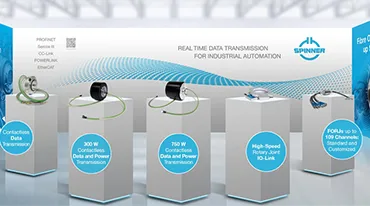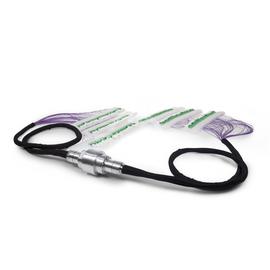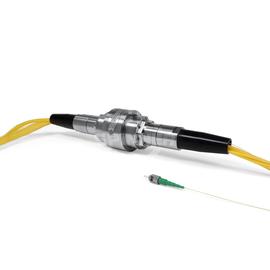
Data Transmission with Fiber Optic Swivels in FPSO Turrets without Multiplexing and up to 109 Channels
SPINNER is one of the world’s leading producers of high-performance rotary joints for off-shore or deep-sea applications - for the reliable transmission of power and data with radio frequency or fiber optic technologies.
If high data rates and immunity to EMI/EMC impacts are required for the transmission of electrical power, communication or sensor data, fiber optic technology is the preferred choice. If rotation is required, such as rotating turrets, SPINNER's robust fibre optic rotary joints (FORJ) are the first choice.
- No multiplexing required
- Only 60 mm hosing diameter
- Fiber types: Singlemode (SM)
- variation of insertion loss while rotating: < 1.5 dB
- Return loss min.: 45 dB (typ. 50 dB)
- Wavelength: 1310 nm and 1550 nm
- Rotational speed: Up to 300 rpm
- Weight (excl. connectors): 1.5 kg
- Torque: 0.15 Nm
- Ingress protection: IP50, IP65
- Recommended temperature range: -40°C to +85°C
- Crosstalk > 50 dB
- GigE with BER ≤ 1 x 10-12
- Shock and vibration tested
SPINNER provides a complete portfolio of fiber optic swivels for turrets and swivel stacks of Floating Production Systems (FPS), including FPSO vessels with a turret at the stern or bow (e.g. External Turret Production (ETP), within the ship’s hull (e.g. Ship Integrated Turring, SIT), or with floating buoys like flexible turret mooring systems, buoy Turret Loading, Turret BALM buoy and many more applications.
SPINNER also offers hybrid couplings in which slip rings with high voltage values are combined with fiber-optic rotary transducers. These systems are used above water, but also pressure compensated for underwater applications.
Request information from Sales
Example products - more variants on request

SPINNER Rotary Joints meet extreme Challenges of the Offshore Oil & Gas Industry
The exploitation of petroleum and natural gas in the sea imposes the same extreme demands on people and materials worldwide - extreme environmental conditions with tides, wind and waves, salt water and aggressive chemicals, cold and heat or the enormous water pressure.
Numerous systems are used to collect the raw oil from the drilling facilities, store it pump it onto oil tankers for shipment - both standing like oil rigs and floating. One widely used floating system are the so-called FPSO units. The term FPSO stands for Floating Production Storage and Offloading and refers to vessels that can accommodate pumping equipment, temporary storage, transport or offloading. They are often more flexible and economical than conventional platform constructions, and the technical equipment is largely the same as that of offshore drilling rigs.
Oil is transported from the borehole on the seabed to the water surface via hoses and pipes. The connection to the FPSO is then made by means of floating buoys, the attachment of the production hoses to turrets or multi product swivels at the ship’s bow, stern or in the hull itself. Because the ship aligns itself with the tide, wind, waves and currents, these towers must be rotatable and flexibly connected.
In addition to receiving oil and gas, power and signals or data are also transmitted in real time for control or measurement in both directions. SPINNER rotary joints already meet the requirements for robustness, lifetime, performance and reliability of transmission in many offshore oil and gas production areas worldwide. Contact our sales team

Contact our experts
Contact your account manager or our product engineers for more detailed product information, required customization, about an order or with any general topic.

SPINNER Newsletter
Subscribe to our Spotlight newsletter in order to receive breaking news about SPINNER GmbH, new products and offers, and the latest technical advances.

Digital Showrooms
Take a virtual tour of our latest innovations on Mobile Comunication, Broadcast, Measurment and Rotating Solutions






